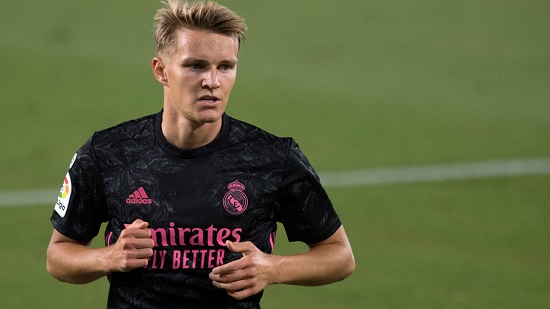This post has already been read 1338 times!
Riqui Puig scored his first goal for Barcelona against Elche last weekend after being circled as one of the world’s most exciting talents almost a decade ago.
In 2014, the Barcelona newspaper Mundo Deportivo revelled in the 14-year-old born in Catalonia, who knew Xavi Hernandez personally and might even one day play like him.
“He’s a great little footballer,” the Catalan newspaper wrote. “He plays between the lines and he’s got fantastic talent. Just as fantastic as his personality.”
In the same year, Martin Odegaard, only a year older than Puig, was already representing Norway and being shown around Real Madrid’s training ground, not because he had joined them but because they were trying to persuade him to.
“Martin Odegaard is 15 years old and already tired,” wrote Marca. “Of hearing offers from all the big clubs in Europe.”
And yet seven years later, Puig was being substituted on Wednesday by Ronald Koeman with Barca 1-0 down to Rayo Vallecano in the Copa del Rey.
Odegaard was being shown around another training ground this week, this time in Hertfordshire in England, where he joined Arsenal on loan.
“Martin has been playing at the top level for a while,” read Arsenal’s statement.
Puig, now 21, is staying to fight for his place while Odegaard, 22, has opted for a fresh start but both have been sidelined by their coaches, despite hopes they would be key as their clubs look to the future.
The disappointment has created tension, with Koeman increasingly agitated by what he sees as too hard a push for Puig to be in his team.
“It’s as if I have a problem with him and that is not the case,” said Koeman. “It’s not good for me or for Riqui.”
Zidane’s future is in doubt, in part because he refuses to embrace the club’s vision for the future, which has Odegaard at its heart.
“You have to prove yourself with the competition there is here, which is fierce,” said Zidane. “You have to show it.” Which begs the question, have they shown enough? And have they been given the chance to? After a decade of dominance in Europe, Barcelona and Real Madrid are at the end of an cycle, both facing up to a need to change while also unsure how to implement it.
Zidane was brought back to clear up the mess in 2019 while Koeman was perceived as someone able to begin the transition.
But neither can afford to wait for Puig and Odegaard to live up to the hype. Their jobs depend on results, particularly while their teams are struggling, adrift in La Liga and no longer considered elite in the Champions League.
Atletico Madrid are looking to extend a seven-point lead over Real Madrid when they play away at Cadiz on Sunday. And with stadiums still empty, the feel-good factor of a favourite like Puig playing in front of fans is gone too. When he slaloms through, there is no surge of support in the stands. When he is substituted, there are no complaints either.
It is possible Puig and Odegaard are not quite good enough, that both will have distinguished careers, but elsewhere, where the demands are less intense. In their positions, particularly, Barca and Madrid only accept the best.
And yet the stagnation also points to the awkwardness of Spain’s two biggest clubs ushering out the old and bringing in the new.
Odegaard may be the future but few would argue he should be playing ahead of Luka Modric against Levante on Saturday. Puig might be an expert passer but at what cost would it be to Barca’s solidity in Sunday’s game against Athletic Bilbao?
Where Koeman has promoted youth it has often been through necessity, Ronald Araujo impressing at centre half, Sergino Dest filling a void at right-back, Pedri dazzling in attacking midfield.
But for those not quite ready, the expectation is not only discarded but perhaps detrimental, the need for patience even less appealing to coaches focused on averting crisis.
Instead, Odegaard has gone and Puig stays but both remain in limbo, years on from when the excitement first began to build, still waiting for their moment to come.
Fixtures (all times GMT)
Friday
Real Valladolid v Huesca (2000)
Saturday
Eibar v Sevilla (1300), Real Madrid v Levante (1515), Valencia v Elche (1730), Villarreal v Real Sociedad (2000)
Sunday
Getafe v Alaves (1300), Cadiz v Atletico Madrid (1515), Granada v Celta Vigo (1730), Barcelona v Athletic Bilbao (2000)
Monday Real Betis v Osasuna (2000)



